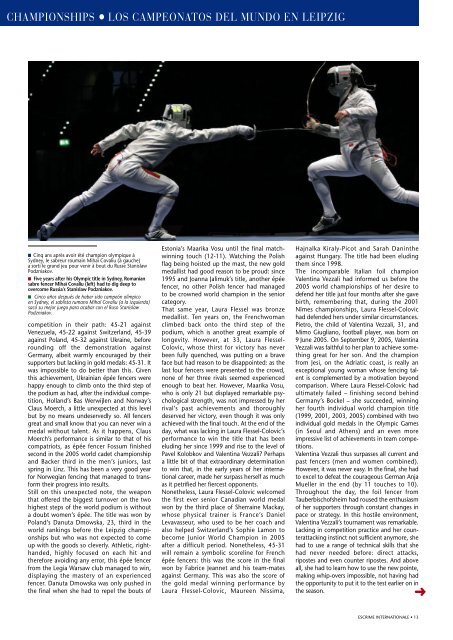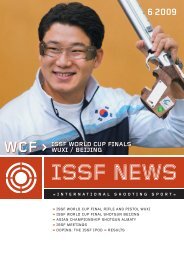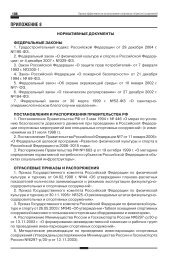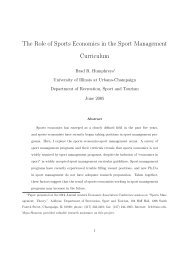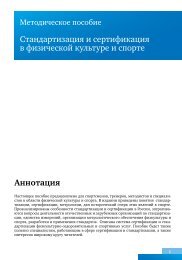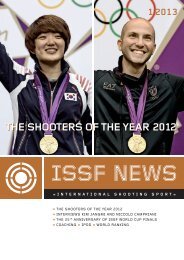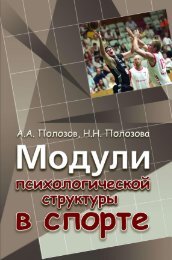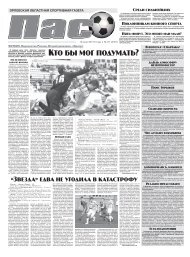Create successful ePaper yourself
Turn your PDF publications into a flip-book with our unique Google optimized e-Paper software.
CHAMPIONSHIPS • LOS CAMPEONATOS DEL MUNDO EN LEIPZIG<br />
■ Cinq ans après avoir été champion olympique à<br />
Sydney, le sabreur roumain Mihaï Covaliu (à gauche)<br />
a sorti le grand jeu pour venir à bout du Russe Stanislaw<br />
Podzniakov.<br />
■ Five years after his Olympic title in Sydney, Romanian<br />
sabre fencer Mihaï Covaliu (left) had to dig deep to<br />
overcome Russia’s Stanislaw Podzniakov.<br />
■ Cinco años después de haber sido campeón olímpico<br />
en Sydney, el sablista rumano Mihaï Covaliu (a la izquierda)<br />
sacó su mejor juego para acabar con el Ruso Stanislaw<br />
Podzniakov.<br />
competition in their path: 45-21 against<br />
Venezuela, 45-22 against Switzerland, 45-39<br />
against Poland, 45-32 against Ukraine, before<br />
rounding off the demonstration against<br />
Germany, albeit warmly encouraged by their<br />
supporters but lacking in gold medals: 45-31. It<br />
was impossible to do better than this. Given<br />
this achievement, Ukrainian épée fencers were<br />
happy enough to climb onto the third step of<br />
the podium as had, after the individual competition,<br />
Holland’s Bas Werwijlen and Norway’s<br />
Claus Moerch, a little unexpected at this level<br />
but by no means undeservedly so. All fencers<br />
great and small know that you can never win a<br />
medal without talent. As it happens, Claus<br />
Moerch’s performance is similar to that of his<br />
compatriots, as épée fencer Fossum finished<br />
second in the <strong>2005</strong> world cadet championship<br />
and Backer third in the men’s juniors, last<br />
spring in Linz. This has been a very good year<br />
for Norwegian fencing that managed to transform<br />
their progress into results.<br />
Still on this unexpected note, the weapon<br />
that offered the biggest turnover on the two<br />
highest steps of the world podium is without<br />
a doubt women’s épée. The title was won by<br />
Poland’s Danuta Dmowska, 23, third in the<br />
world rankings before the <strong>Leipzig</strong> championships<br />
but who was not expected to come<br />
up with the goods so cleverly. Athletic, righthanded,<br />
highly focused on each hit and<br />
therefore avoiding any error, this épée fencer<br />
from the Legia Warsaw club managed to win,<br />
displaying the mastery of an experienced<br />
fencer. Danuta Dmowska was only pushed in<br />
the final when she had to repel the bouts of<br />
Estonia’s Maarika Vosu until the final matchwinning<br />
touch (12-11). Watching the Polish<br />
flag being hoisted up the mast, the new gold<br />
medallist had good reason to be proud: since<br />
1995 and Joanna Jalimuk’s title, another épée<br />
fencer, no other Polish fencer had managed<br />
to be crowned world champion in the senior<br />
category.<br />
That same year, Laura Flessel was bronze<br />
medallist. Ten years on, the Frenchwoman<br />
climbed back onto the third step of the<br />
podium, which is another great example of<br />
longevity. However, at 33, Laura Flessel-<br />
Colovic, whose thirst for victory has never<br />
been fully quenched, was putting on a brave<br />
face but had reason to be disappointed: as the<br />
last four fencers were presented to the crowd,<br />
none of her three rivals seemed experienced<br />
enough to beat her. However, Maarika Vosu,<br />
who is only 21 but displayed remarkable psychological<br />
strength, was not impressed by her<br />
rival’s past achievements and thoroughly<br />
deserved her victory, even though it was only<br />
achieved with the final touch. At the end of the<br />
day, what was lacking in Laura Flessel-Colovic’s<br />
performance to win the title that has been<br />
eluding her since 1999 and rise to the level of<br />
Pavel Kolobkov and Valentina Vezzali? Perhaps<br />
a little bit of that extraordinary determination<br />
to win that, in the early years of her international<br />
career, made her surpass herself as much<br />
as it petrified her fiercest opponents.<br />
Nonetheless, Laura Flessel-Colovic welcomed<br />
the first ever senior Canadian world medal<br />
won by the third place of Sherraine Mackay,<br />
whose physical trainer is France’s Daniel<br />
Levavasseur, who used to be her coach and<br />
also helped Switzerland’s Sophie Lamon to<br />
become Junior World Champion in <strong>2005</strong><br />
after a difficult period. Nonetheless, 45-31<br />
will remain a symbolic scoreline for French<br />
épée fencers: this was the score in the final<br />
won by Fabrice Jeannet and his team-mates<br />
against Germany. This was also the score of<br />
the gold medal winning performance by<br />
Laura Flessel-Colovic, Maureen Nissima,<br />
Hajnalka Kiraly-Picot and Sarah Daninthe<br />
against Hungary. The title had been eluding<br />
them since 1998.<br />
The incomparable Italian foil champion<br />
Valentina Vezzali had informed us before the<br />
<strong>2005</strong> world championships of her desire to<br />
defend her title just four months after she gave<br />
birth, remembering that, during the 2001<br />
Nîmes championships, Laura Flessel-Colovic<br />
had defended hers under similar circumstances.<br />
Pietro, the child of Valentina Vezzali, 31, and<br />
Mimo Giugliano, football player, was born on<br />
9 June <strong>2005</strong>. On September 9, <strong>2005</strong>, Valentina<br />
Vezzali was faithful to her plan to achieve something<br />
great for her son. And the champion<br />
from Jesi, on the Adriatic coast, is really an<br />
exceptional young woman whose fencing talent<br />
is complemented by a motivation beyond<br />
comparison. Where Laura Flessel-Colovic had<br />
ultimately failed – finishing second behind<br />
Germany’s Bockel – she succeeded, winning<br />
her fourth individual world champion title<br />
(1999, 2001, 2003, <strong>2005</strong>) combined with two<br />
individual gold medals in the Olympic Games<br />
(in Seoul and Athens) and an even more<br />
impressive list of achievements in team competitions.<br />
Valentina Vezzali thus surpasses all current and<br />
past fencers (men and women combined).<br />
However, it was never easy. In the final, she had<br />
to excel to defeat the courageous German Anja<br />
Mueller in the end (by 11 touches to 10).<br />
Throughout the day, the foil fencer from<br />
Tauberbischofsheim had roused the enthusiasm<br />
of her supporters through constant changes in<br />
pace or strategy. In this hostile environment,<br />
Valentina Vezzali’s tournament was remarkable.<br />
Lacking in competition practice and her counterattacking<br />
instinct not sufficient anymore, she<br />
had to use a range of technical skills that she<br />
had never needed before: direct attacks,<br />
ripostes and even counter ripostes. And above<br />
all, she had to learn how to use the new pointe,<br />
making whip-overs impossible, not having had<br />
the opportunity to put it to the test earlier on in<br />
the season.<br />
ESCRIME INTERNATIONALE • 13<br />
➜


